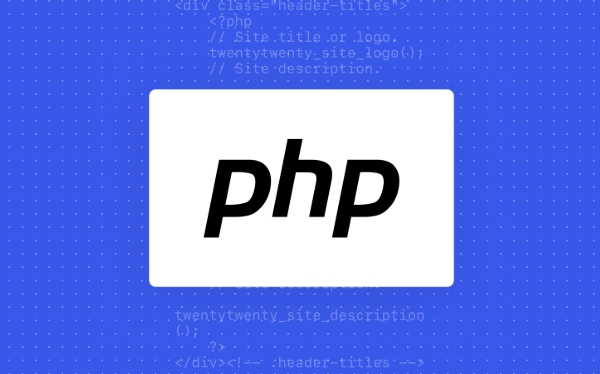 Backend Development
Backend Development
 PHP Tutorial
PHP Tutorial
 Understanding Operator Precedence in Complex PHP `if` Statements
Understanding Operator Precedence in Complex PHP `if` Statements
Understanding Operator Precedence in Complex PHP `if` Statements
Jul 31, 2025 pm 12:16 PMPHP evaluates logical operators based on precedence, where && has higher precedence than || and ! has high precedence; thus, expressions like $a || $b && $c are evaluated as $a || ($b && $c), not left to right; to ensure correct logic and readability, always use parentheses to explicitly group conditions, such as ($userIsLoggedIn && $isAdmin) || $hasPermission; when using ! with comparisons, wrap the comparison in parentheses like !($a === $b) to avoid unintended behavior; break complex conditions into descriptive variables for clarity; and test edge cases to confirm expected outcomes, because while operator precedence is predictable, relying on it without explicit grouping can lead to subtle bugs and misinterpretations.

When writing complex if statements in PHP, especially those involving multiple operators like &&, ||, !, ==, ===, and parentheses, understanding operator precedence is crucial. Without a clear grasp of how PHP evaluates these expressions, your logic might not behave as expected—even if the code looks correct at first glance.

How PHP Evaluates Mixed Logical Operators
PHP follows a defined order of operations—called operator precedence—to determine which parts of an expression are evaluated first. In if statements, this can drastically change the outcome.
For example, consider this expression:

if ($a || $b && $c)
You might assume it's evaluated left to right: ($a || $b) && $c. But that's not how PHP works.
Because && has higher precedence than ||, PHP actually reads it as:

if ($a || ($b && $c))
This means if $a is true, the whole condition is true, regardless of $b and $c. That might be what you want—but if your intent was to group $a || $b first, you’ll get unexpected behavior.
Why Parentheses Are Your Best Friend
Even if you know the precedence rules, relying on them without parentheses makes code harder to read and maintain. The safest and clearest approach is to use parentheses to explicitly define your logic.
Instead of:
if ($userIsLoggedIn && $isAdmin || $hasPermission)
Write:
if ($userIsLoggedIn && ($isAdmin || $hasPermission))
Now it’s clear that the user must be logged in and either be an admin or have permission. Without parentheses, the result is the same (since && precedes ||), but the intent is much clearer.
But if you meant something different—like allowing access if the user is logged in and an admin, or if they have permission regardless of login status—you'd need:
if (($userIsLoggedIn && $isAdmin) || $hasPermission)
Now the logic is completely different. This shows how small changes in grouping can alter access control behavior.
Common Pitfalls with ! and Comparison Operators
Another area where precedence trips people up is combining ! (logical NOT) with comparisons.
Take this:
if (! $a == $b)
You might think it means “if $a is not equal to $b”, but PHP reads it as:
if (!($a == $b))
Which is actually the same as $a != $b—so it works as expected in this case.
But consider:
if (! $a == null)
This is equivalent to !( $a == null ), or $a !== null. Again, correct—but what if you write:
if (! $a === $b)
Now it's (! $a) === $b. So if $a is false, !$a becomes true, and you're checking if true === $b. That’s probably not what you meant.
To avoid this, always wrap the comparison first:
if (!($a === $b))
Key Takeaways for Writing Reliable if Statements
To avoid bugs and confusion:
- Know the basics:
!has high precedence,&&is higher than||. - Use parentheses liberally to group logical units—even when not required.
- Break complex conditions into variables if they get too hard to read:
$hasBasicAccess = $userIsLoggedIn && $isActive;
$hasSpecialAccess = $isAdmin || $hasOverride;
if ($hasBasicAccess || $hasSpecialAccess) { ... }-
Test edge cases: Try different combinations of
true/falseto verify logic flows as intended.
Basically, operator precedence is predictable in PHP—but relying on memory alone is risky. Explicit grouping with parentheses makes your intent clear and prevents subtle bugs. It’s not about knowing the rules; it’s about writing code that’s easy to understand and hard to get wrong.
The above is the detailed content of Understanding Operator Precedence in Complex PHP `if` Statements. For more information, please follow other related articles on the PHP Chinese website!

Hot AI Tools

Undress AI Tool
Undress images for free

Undresser.AI Undress
AI-powered app for creating realistic nude photos

AI Clothes Remover
Online AI tool for removing clothes from photos.

Clothoff.io
AI clothes remover

Video Face Swap
Swap faces in any video effortlessly with our completely free AI face swap tool!

Hot Article

Hot Tools

Notepad++7.3.1
Easy-to-use and free code editor

SublimeText3 Chinese version
Chinese version, very easy to use

Zend Studio 13.0.1
Powerful PHP integrated development environment

Dreamweaver CS6
Visual web development tools

SublimeText3 Mac version
God-level code editing software (SublimeText3)

Hot Topics
 Demystifying Type Juggling: The Critical Difference Between `==` and `===`
Jul 30, 2025 am 05:42 AM
Demystifying Type Juggling: The Critical Difference Between `==` and `===`
Jul 30, 2025 am 05:42 AM
Using === instead of == is the key to avoid PHP type conversion errors, because == will cause unexpected results, and === compare values and types at the same time to ensure accurate judgment; for example, 0=="false" is true but 0==="false" is false, so when dealing with return values that may be 0, empty strings or false, === should be used to prevent logical errors.
 When Not to Use the Ternary Operator: A Guide to Readability
Jul 30, 2025 am 05:36 AM
When Not to Use the Ternary Operator: A Guide to Readability
Jul 30, 2025 am 05:36 AM
Avoidnestedternariesastheyreducereadability;useif-elsechainsinstead.2.Don’tuseternariesforsideeffectslikefunctioncalls;useif-elseforcontrolflow.3.Skipternarieswithcomplexexpressionsinvolvinglongstringsorlogic;breakthemintovariablesorfunctions.4.Avoid
 The Null Coalescing Operator (??): A Modern Approach to Handling Nulls
Aug 01, 2025 am 07:45 AM
The Null Coalescing Operator (??): A Modern Approach to Handling Nulls
Aug 01, 2025 am 07:45 AM
Thenullcoalescingoperator(??)providesaconcisewaytoassigndefaultvalueswhendealingwithnullorundefined.1.Itreturnstheleftoperandifitisnotnullorundefined;otherwise,itreturnstherightoperand.2.UnlikethelogicalOR(||)operator,??onlytriggersthefallbackfornull
 Beyond `if-else`: Exploring PHP's Alternative Control Structures
Jul 30, 2025 am 02:03 AM
Beyond `if-else`: Exploring PHP's Alternative Control Structures
Jul 30, 2025 am 02:03 AM
The alternative control structure of PHP uses colons and keywords such as endif and endfor instead of curly braces, which can improve the readability of mixed HTML. 1. If-elseif-else starts with a colon and ends with an endif, making the condition block clearer; 2. Foreach is easier to identify in the template loop, and endforeach clearly indicates the end of the loop; 3. For and while are rarely used, they are also supported. This syntax has obvious advantages in view files: reduce syntax errors, enhance readability, and is similar to HTML tag structure. But curly braces should continue to be used in pure PHP files to avoid confusion. Therefore, alternative syntax is recommended in templates that mix PHP and HTML to improve code maintainability.
 Refactoring Nested `if` Hell: Strategies for Cleaner Conditional Logic
Jul 30, 2025 am 04:28 AM
Refactoring Nested `if` Hell: Strategies for Cleaner Conditional Logic
Jul 30, 2025 am 04:28 AM
Useguardclausestoreturnearlyandflattenstructure.2.Extractcomplexconditionsintodescriptivefunctionsorvariablesforclarityandreuse.3.Replacemultipleconditioncombinationswithalookuptableorstrategypatterntocentralizelogic.4.Applypolymorphismtoeliminatetyp
 Optimizing Conditional Logic: Performance Implications of `if` vs. `switch`
Aug 01, 2025 am 07:18 AM
Optimizing Conditional Logic: Performance Implications of `if` vs. `switch`
Aug 01, 2025 am 07:18 AM
Sometimes it will affect performance, depending on the language, compiler optimization and logical structure; 1. If statements are executed in order, and the worst case time complexity is O(n), the most likely condition should be placed first; 2. The switch statement can be optimized by the compiler to a jump table of O(1) when the conditions are continuous integers, many branches and the values are compiled constants; 3. When a single variable is compared with multiple constant integers and there are many branches and switches are faster; 4. When it involves scope judgment, complex conditions, non-integer types or fewer branches, if if is more suitable or has similar performance; 5. Different languages (such as C/C, Java, JavaScript, C#) have different optimization degrees of switches, and they need to be tested in combination with actual testing; Swi should be used first
 Crafting Bulletproof Conditionals with Strict Type Comparisons
Jul 30, 2025 am 04:37 AM
Crafting Bulletproof Conditionals with Strict Type Comparisons
Jul 30, 2025 am 04:37 AM
Alwaysusestrictequality(===and!==)inJavaScripttoavoidunexpectedbehaviorfromtypecoercion.1.Looseequality(==)canleadtocounterintuitiveresultsbecauseitperformstypeconversion,making0==false,""==false,"1"==1,andnull==undefinedalltrue.2
 `&&` vs. `and`: Unveiling the Subtle but Critical Differences in PHP
Aug 01, 2025 am 06:04 AM
`&&` vs. `and`: Unveiling the Subtle but Critical Differences in PHP
Aug 01, 2025 am 06:04 AM
&& and and are the same logical functions in PHP, but the priority is different, resulting in different execution orders; && priority is higher than and and and the priority is lower than the assignment operator =; therefore $success=trueandfalse is actually parsed as ($success=true)andfalse, making $success still true; 1. Use && and || in conditional judgment; 2. Use and and or only in control flows (such as $file=fopen()ordie()); 3. Complex expressions should use brackets to clarify the priority; 4. Avoid mixing and/or in assignments unless explicitly intended.





